Hannes Maasel (born 10 October 1951) is an Estonian politician. Since 1999 he has served as the governor of Hiiu County. [1]
Hannes Maasel (born 10 October 1951) is an Estonian politician. Since 1999 he has served as the governor of Hiiu County. [1]

The economy of Estonia is rated advanced by the World Bank, i.e. with high quality of life and advanced infrastructure relative to less industrialized nations. Estonia is a member of the European Union, eurozone and OECD The economy is heavily influenced by developments in the Finnish and Swedish economies.

Tallinn is the capital and most populous city of Estonia. Situated on a bay in north Estonia, on the shore of the Gulf of Finland of the Baltic Sea, Tallinn has a population of about 461,000 and administratively lies in the Harju maakond (county). Tallinn is the main governmental, financial, industrial, and cultural centre of Estonia. It is located 187 km (116 mi) northwest of the country's second largest city, Tartu; however, only 80 km (50 mi) south of Helsinki, Finland, also 320 km (200 mi) west of Saint Petersburg, Russia, 300 km (190 mi) north of Riga, Latvia, and 380 km (240 mi) east of Stockholm, Sweden. From the 13th century until the first half of the 20th century, Tallinn was known in most of the world by variants of its other historical name Reval.

The Baltic states or the Baltic countries is a geopolitical term encompassing Estonia, Latvia, and Lithuania. All three countries are members of NATO, the European Union, the Eurozone, and the OECD. The three sovereign states on the eastern coast of the Baltic Sea are sometimes referred to as the "Baltic nations", less often and in historical circumstances also as the "Baltic republics", the "Baltic lands", or simply the Baltics.

The kroon was the official currency of Estonia for two periods in history: 1928–1940 and 1992–2011. Between 1 January and 14 January 2011, the kroon circulated together with the euro, after which the euro became the sole legal tender in Estonia. The kroon was subdivided into 100 cents.
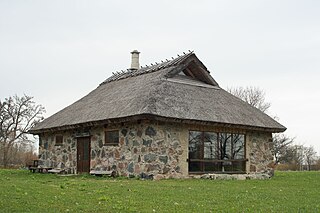
Abruka is a village in Estonia, primarily composed of the 8.78 km2 (3.39 sq mi) island of Abruka in the Gulf of Riga, 4 km south of the island of Saaremaa. The village includes the smaller adjacent islands of Vahase, Kasselaid, Linnusitamaa and Kirjurahu, resulting in a total area of 10.1 km2 (3.9 sq mi).

Ida-Viru County is one of 15 counties of Estonia. It is the most north-eastern part of the country. The county contains large deposits of oil shale - the main mineral mined in Estonia. Oil shale is used in the production of shale oil and in thermal power plants. The capital of the county is the town of Jõhvi which is administratively united with the Jõhvi Parish; nevertheless, Narva is the largest town in the county in terms of population and at the same time the third largest city in Estonia after Tallinn and Tartu.

Lääne County is one of the 15 counties of Estonia. It is located in western Estonia and borders the Baltic Sea to the north, Harju County to the north-east, Rapla County to the east, Pärnu County to the south, and the island counties of Saare and Hiiu to the west. In January 2009 Lääne County had a population of 23,810 – constituting 2.0% of the total population in Estonia.

Football Club Infonet Levadia Tallinn, commonly known as FCI Levadia, or simply as Levadia, is an Estonian professional football club based in Tallinn that competes in the Meistriliiga, the top flight of Estonian football. The club's home ground is Lilleküla Stadium.
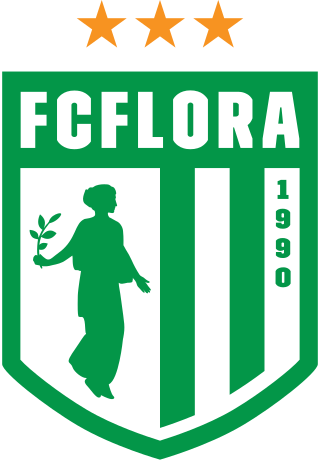
FC Flora, commonly known as Flora Tallinn, or simply as Flora, is an Estonian professional football club based in Tallinn that competes in the Meistriliiga, the top flight of Estonian football. The club's home ground is Lilleküla Stadium.
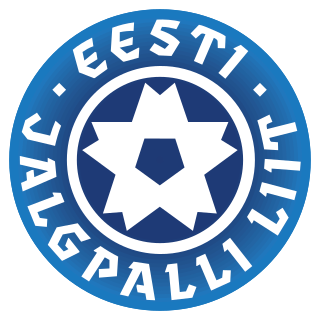
The Estonia men's national football team represents Estonia in international football matches and is controlled by the Estonian Football Association, the governing body for football in Estonia. Estonia's home ground is Lilleküla Stadium in the capital city Tallinn.
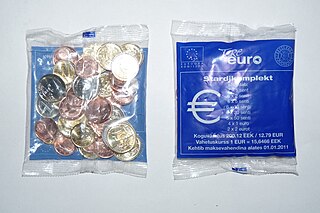
Estonian euro coins feature a single design for all eight coins. This is a design by Lembit Lõhmus and features a silhouette map of Estonia together with the word Eesti (Estonia) and twelve stars, symbolic of the European Union, surrounding the map. This was the winning design in a public vote of ten announced in December 2004.

Kallemäe is a village in Saaremaa Parish, Saare County, Estonia, on the island of Saaremaa. As of the 2011 census, the settlement's population was 39.

Estonia–Russia relations are the bilateral foreign relations between Estonia and Russia. Diplomatic relations between the two countries were established on 2 February 1920 after the Estonian War of Independence ended in Estonian victory with Russia recognizing Estonia's sovereignty and renounced any and all territorial claims on Estonia.

Estonia, officially the Republic of Estonia, is a country by the Baltic Sea in Northern Europe. It is bordered to the north by the Gulf of Finland across from Finland, to the west by the sea across from Sweden, to the south by Latvia, and to the east by Lake Peipus and Russia. The territory of Estonia consists of the mainland, the larger islands of Saaremaa and Hiiumaa, and over 2,300 other islands and islets on the eastern coast of the Baltic Sea, covering a total area of 45,335 square kilometres (17,504 sq mi). Tallinn, the capital city, and Tartu are the two largest urban areas. The Estonian language is the indigenous and official language of Estonia. It is the first language of the majority of the country's population of 1.4 million, as well as the world's second-most spoken Finnic language.
Aula-Vintri is a village in Saaremaa Parish, Saare County, Estonia, on the island of Saaremaa.
The 2011 Meistriliiga was the 21st season of the Meistriliiga, the top Estonian league for association football clubs, since its establishment in 1992. The season began on 5 March 2011 and concluded on 5 November 2011. The defending champions Flora won their ninth league title.
The Estonian Women's Cup is the national women's football cup competition in Estonia. It was first held in 2007.
2011–12 Estonian Cup is the twenty-second season of the Estonian football knockout tournament organized by the Estonian Football Association. The winner qualified for the first qualifying round of the 2012–13 UEFA Europa League.
The 2012 season of the Meistriliiga the first level in the Estonian football system is the 22nd season in the league's history. The competition started on 10 March 2012 and will end on 3 November 2012. The defending champions are Flora, who won their ninth league championship last year.
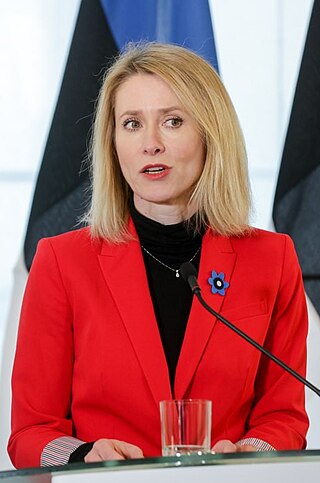
Kaja Kallas is an Estonian politician and the current prime minister of Estonia since 2021, the first woman to serve in the role. The leader of the Reform Party since 2018, she was a member of parliament (Riigikogu) in 2011–2014, and 2019–2021. Kallas was a member of the European Parliament in 2014–2018, representing the Alliance of Liberals and Democrats for Europe. Before her election to Riigikogu, she was a lawyer specialising in European competition law.